The top five RPG Maker games
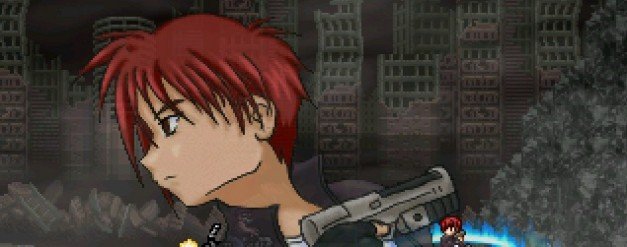
On the great map of PC gaming, the RPG Maker Network lies somewhere south of indie and west of modding. An often-overlooked community with strong ties to the fractious independent nations of fandom, the network is known for its abundant remakes and demakes of classic console JRPGs. More recently, though, a series of avant-garde releases - the harrowing (and very adult) Beautiful Escape: Dungeoneer , the legitimate surrealism of Space Funeral – have drawn attention to RPG Maker as something more, perhaps, than just a repository for pet projects and Deep Internet stickiness. Here are games that make a strong case for RPG Maker as a vibrant – if not commercially viable – platform for indie development, that treat the oft-lamented JRPG formula as a springboard for some pretty exciting and involved thinking about games.
All of this raises the question: what else is going on? The RPG Maker network is a big, strange place, that can only be judged so far on the merits of a few prodigal children. A cursory search reveals a wealth of fan sequels and personal epics, parodies and experiments, puzzles and pastiche. Each of these is a free game that will run on your netbook: good or bad, we thought it was about time to take the tour.
The result is a list of five games that we reckon are worth your time. We were looking for games with polish, mechanical chops, and maybe – just maybe – a bit of originality. Which isn't to say that games featuring amnesia and big hair haven't made the cut (they most certainly have) – but in each case we wanted to ensure that effort and innovation were duly celebrated.
In no particular order, they are:
Alter A.I.L.A Genesis
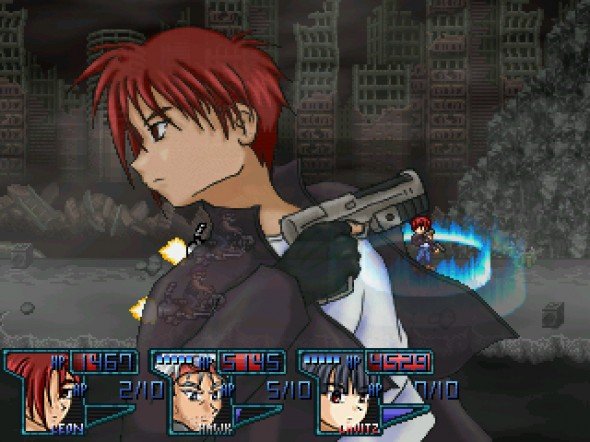
One of the most celebrated games on the network, Alter A.I.L.A Genesis is a side-scrolling cyberpunk epic offering a thorough reworking of traditional JRPG gameplay. Genesis builds upon the existing RPG Maker 2003 combat system, adding an extensive resistance/damage-type system along with a escalating series of EX attacks and 'Field Effects' (environmental conditions) – all of which must be taken into account when building a team. Experienced JRPG players will recognise most if not all of these from other games; but in the context of a lengthy, free adventure built by a single creator it's impressive stuff.
The plot, while familiar, is sufficiently well-told to pass without incident. There are highs and lows – while the game's hand-drawn artwork can be ropey, there's some accomplished spritecraft on display and the soundtrack is punchy without becoming overbearing. Perhaps thanks to its unique perspective, Alter A.I.L.A Genesis doesn't really feel like anything else on RPG Maker – no small feat, given the swap-and-trade nature of the community.
When it comes down to it, though, the combat system is the reason to give Genesis your time. If you're looking to sink a few hours into honing a squad, rooting out hidden areas and working on your boss strategies, this is your game.
The biggest gaming news, reviews and hardware deals
Keep up to date with the most important stories and the best deals, as picked by the PC Gamer team.
Professor McLogic Saves The Day
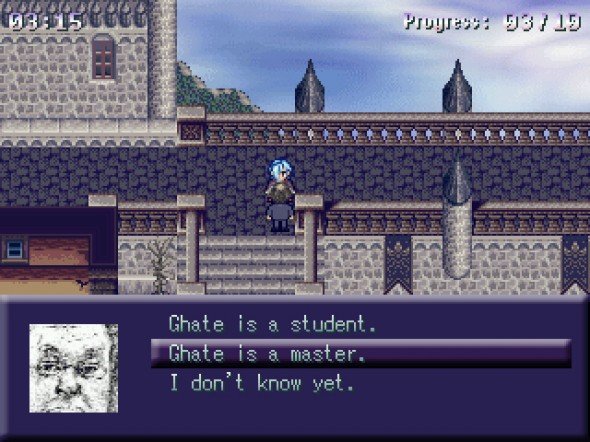
Remember those logic puzzles that used to crop up from time to time in RPGs? The “one-of-these-people-is-a-liar” sequences which only someone with Roaming Protagonist Powers could hope to solve? Professor McLogic Saves The Day is like that. Except it's nothing but that, and rather than providing an opportunity to demonstrate your tremendous INT score, McLogic is perfectly happy to pummel you into submission faster than you can say “IF feeling like an idiot is fun, THEN you will thoroughly enjoy this game.”
The game challenges you to solve a set number of randomly-generated problems within each of ten scenarios, ramping up the difficulty as you go. You're being timed, but for the majority of players simply achieving the requisite amount of successes will be challenge enough. Perseverance and a pen will see you through, however, and the smugness provoked by a successful guess (ahem, deduction) is its own reward.
Crucially, Professor McLogic Saves The Day also realises the importance of presentation – logic puzzles hardly drip with charm in and of themselves. Scenarios range from identifying rabid (talking) animals in a forest, to delineating World of Warcraft players, to preventing vampires from amassing commemorative plaques – each with their own silly denouement. It's daft, entertaining stuff, and a perfect counterpoint to the intellectual meltdown that the game will inevitably induce.
Clock of Atonement
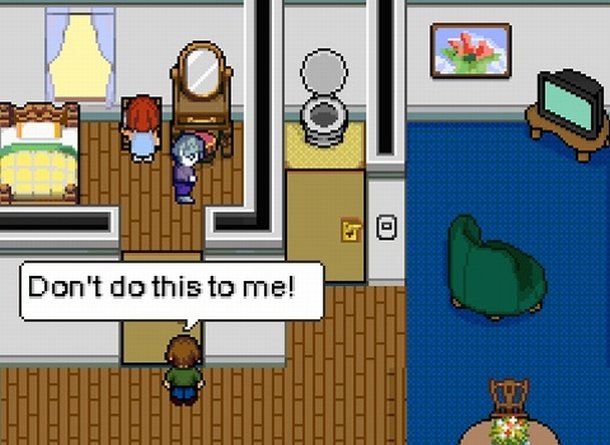
If you came to RPG Maker through Beautiful Escape: Dungeoneer, then Clock of Atonement should be of interest (If you have any issues with the version on RPG Maker, try this link instead. Be warned, though: while it might not share that game's tone, it doesn't shy away from depicting similarly disturbing acts. You are a stalker who, having killed the woman of his obsessions, is granted the power to freeze and rewind time. Returning to the scene of the crime, you manipulate the events leading up to the murder to prevent yourself from carrying it out.
The game takes place entirely in a small single-screen apartment, with usable items highlighted during pauses. Figuring out whether to turn off the lights, knock over a chair, or open a door in a given circumstance is more often than not a matter of trial and error, but there's a tangible sense of causality between your actions and their consequences and a few deft pieces of puzzle design. Even with multiple endings, though, this is a short game – it shouldn't take longer than 20 minutes to see everything it has to offer.
It's the big ideas that make Clock of Atonement compelling. Rare is the game that treats inaction as a viable choice with its own set of consequences, and rarer still is the game that punishes bad decisions by forcing you to watch your avatar do horrible things to a far more sympathetic character. In some ways the most innovative game on this list, it's a shame there's not more to it: that said, we're not sure how much more we really want to see.
One Night 3
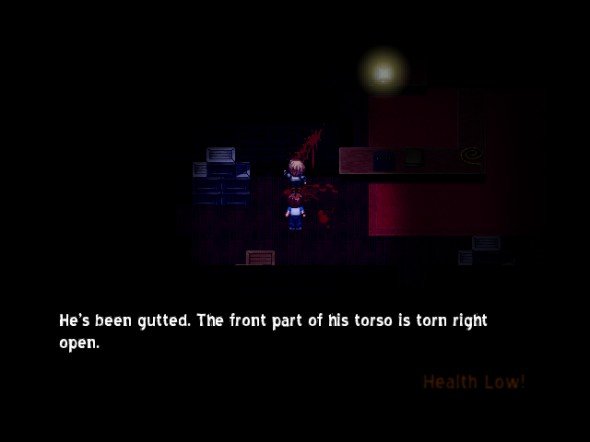
Making a survival horror game in RPG Maker is an interesting proposition – a top-down view doesn't traditionally lend itself to jump scares, and sprites have a tendency to be, well, spritely. That hasn't stopped creator Dark Gaia from making three One Night games, however, and despite the fact that the monsters are all strangely adorable and the blood looks like jam they're enjoyable fare. We might even confess to being a bit unnerved by certain sequences, but would argue that Creepy Singing was a cheap shot. Whatever. Shut up.
Gameplay-wise, you're looking at a few hours of scavenging for supplies, solving puzzles, and avoiding monsters – though the tile-based nature of RPG Maker makes that latter aspect a little more like switching partners at a square dance than desperately fleeing for one's life. Amnesia it ain't, but it works in its own way: being touched by a monster brings up a trio of options (almost roguelike in its implementation) which add a strategic dimension to play. How and how much you fight also influences an invisible morality score which impacts upon the game's ending - subtle implementations of these systems are always deserving of a pat on the head.
The writing varies in quality and the narrative got lost somewhere on a misty highway and ended up in Silent Hill, but One Night 3 deserves some cred for turning survival horror into something that can be idly enjoyed on a lazy afternoon.
Starless Umbra
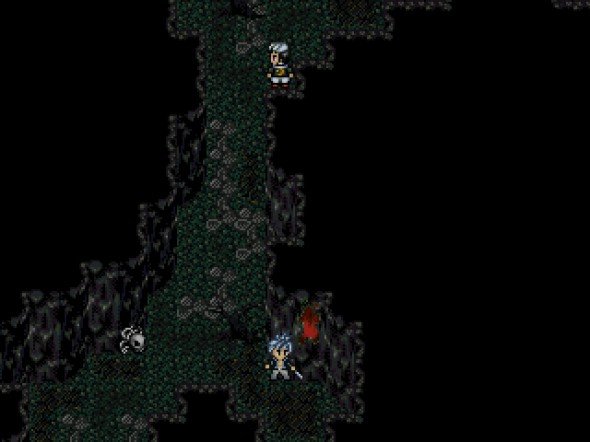
Just over three years old and still unfinished, Starless Umbra is, like Alter A.I.L.A Genesis, a tribute to the dedication and quiet madness of some of RPG Maker Network's creators. As with any personal project of this magnitude, the six chapters currently available are uneven in quality, but despite that this is still one of the most varied and impressive games on the network. Perhaps most remarkably, Starless Umbra does a better job of breaking up the inherent repetitiveness of the JRPG formula than the majority of commercial releases.
The combat system is adept, with a range of upgradable skills that give the game a more modern feel than most of its peers. The stars of the show, however, are the puzzles and minigames that punctuate the flow of play – from the early dungeon that becomes a cover-shooter to latter-game underwater exploration and minecart sequences. It's throwaway stuff, but that's not necessarily a bad thing – and among a sea of derivative fantasy offerings, it's this variety that sets Starless Umbra apart.
The best RPG Maker games make you suspect that in some alternate reality we're sitting around watching CGI trailers for Starless Umbra XIV while bemoaning the lack of keyboard and mouse support in World of Alter A.I.L.A Online. The technology and design sensibility supporting these games may be fifteen years old, but the generosity of spirit on display is refreshing – and it really doesn't hurt that they're free.
Joining in 2011, Chris made his start with PC Gamer turning beautiful trees into magazines, first as a writer and later as deputy editor. Once PCG's reluctant MMO champion , his discovery of Dota 2 in 2012 led him to much darker, stranger places. In 2015, Chris became the editor of PC Gamer Pro, overseeing our online coverage of competitive gaming and esports. He left in 2017, and can be now found making games and recording the Crate & Crowbar podcast.


